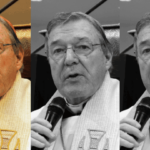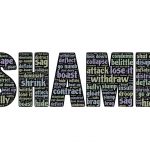The Offence of Contravening a Court Suppression or Non-Publication Order in NSW

The very real impact and influence of media reporting and social media commentary upon high profile criminal trials in the past couple of years has led Victorian criminal defence lawyers to apply to have evidence withheld from the public ahead of a possible Supreme Court murder trial.
The trial
The lawyers for Greg Lynn, the man accused of killing elderly campers Russell Hill and Carol Clay have won a bid order to keep some evidence secret pre-trial, including more than 5,000 covert police recordings from Lynn’s home and car prior to his arrest.
Mr Lynn, who has denied killing the couple, is currently facing a committal hearing before a magistrate to determine whether there is enough evidence for his case to proceed to trial.
Despite a number of arguments from various media outlets, desperate to cover what has been an intriguing murder case so far, Magistrate Brett Sonnet granted the suppression order, which prevents the publication of certain evidence that is sought to be relied on by the prosecution in the case.
Mr Lynn is not required to enter a plea until the end of the committal hearing, although it is expected that he will plead not guilty.
A redacted version of the police brief has been provided to the media, and other information will be tightly distributed on the same basis now that the suppression order is in place.
What is a court suppression order?
A suppression order is a court order which prohibits the disclosure of information about a legal case. They can be put in place for a number of reasons, but are usually to guarantee the safety of witnesses or to guarantee a fair trial.
As we have seen in recent times, media reporting can adversely impact criminal trials. While most journalists, particularly those reporting on court cases, understand protocols around reporting, sometimes mistakes are made.
But of more concern for the judicial process is social media commentary which can spread like wildfire.
Not only is it increasingly difficult to know which social media pages publish trustworthy credible information, it’s particularly pervasive, which makes finding a truly independent jury difficult.
High profile trials and the media frenzy
This was an argument put forward by the defence lawyers representing Chris Dawson, accused of murdering his wife Lyn in 1982, and he was granted a judge-alone trial. He was subsequently found guilty and is now serving a 24-year prison term.
A judge-alone trial was not possible for Bruce Lehrmann when he faced sexual assault charges because under the ACT’s law, sexual assault cases must be tried by a jury. In the case of Brittany Higgins versus Bruce Lehrmann, both were heavily scrutinised by the press in the lead up to the trial and it was actually delayed at one point after comments were made by Lisa Wilkinson, and radio hosts Brendan Jones and Amanda Keller. The trial was aborted after a jury member brought information found on the web to jury deliberations, despite being told not to do so.
Other accusations in terms of the way police handled the case, have meant that the entire judicial process – from police investigations through to the trial itself, is now under investigation.
Fined for contravening court suppression order
In 2016, Yahoo7 was fined $30,000 and journalist Krystal Johnson was convicted of the criminal offence of contempt of court after publishing details about a defendant that had not been heard in the courtroom, leading to a Melbourne murder trial being aborted. Ms Johnson was given a two-year good behaviour bond.
During the trial of now deceased Catholic Priest George Pell a reporting ban was put in place at the start of Cardinal Pell’s 2018 trial to prevent the possibility of prejudice affecting a separate trial he was to face on other charges.
Under the suppression order, journalists were banned from reporting any detail of the sexual abuse case, including the outcome. Pell was acquitted of all charges against him in 2020. He returned to the Vatican shortly after and died earlier this month.
Several news organizations in Australia ignored the suppression order and they were fined for ‘contempt of court’. Amongst them, The Age newspaper was fined $450,000 and News Corp was fined more than $400,000. The Australian Financial Review was fined $162,000 and the Today show was fined $30,000.
The right to a fair trial
Although these fines are substantial, deliberately, in order to make media companies more accountable, and to ensure proper oversight about what information is published, many argue that it is a relatively small price to pay, particularly when it has the potential to impact a criminal trial, where the fate of the innocent and the guilty are determined.
The right to a fair trial is a cornerstone of our justice system – and it must be protected.
The offence of contravening a suppression or non-publication order in New South Wales
Section 16(1) of the Court Suppression and Non-Publication Orders Act 2010 (NSW) prescribes a maximum penalty of 12 months in prison and/or a fine of 1000 penalty units for a person, or 5000 penalty units for a corporation, who ‘ engages in conduct that constitutes a contravention of a suppression order or non-publication order and is reckless as to whether the conduct constitutes a contravention of a suppression order or non-publication order.’
A penalty unit is currently equivalent to $110 in New South Wales, which means the maximum fine is $110,000 for a person or $550,000 for a company.
To establish the offence, the prosecution must prove beyond reasonable doubt that:
- A suppression or non-publication order was in place,
- You engaged in conduct that contravened the order, and
- You were at least reckless as to whether your conduct amounted to a contravention.
You were reckless if you realised at the time of your conduct that you may possibly contravene the order but you went ahead with your actions regardless.
Legal defences to the charge
In the event you are able to raise evidence of a legal defence to the charge, the onus then shifts to the prosecution to disprove that defence beyond a reasonable doubt.
You are entitled to an ‘acquittal’ (ie a not guilty verdict) if the prosecution is unable to do so.
Legal defences to the charge include duress, necessity and self-defence.
May alternatively be charged as a contempt of court
Subsection 16(2) of the Court Suppression and Non-Publication Orders Act makes clear that, ‘[c]onduct that constitutes an offence under this section may be punished as a contempt of court even though it could be punished as an offence.’
What is contempt of court?
A contempt of court is an act that has the tendency to interfere with or undermine the authority, performance, or dignity of the court or those who participate in court proceedings.
It is an offence under section 24 of the Local Court Act 2007 and section 199 of the District Court Act 1973, as well as Part 55 of the Supreme Court Rules 1970.
The offence carries a maximum penalty of 28 days in prison and/or a fine of 20 penalty units, which amounts to $2,200 at the time of writing.
What does the prosecution have to prove?
For a person to be found guilty of contempt of, the prosecution must establish each of the following ‘elements’ (or ingredients) of the offence beyond a reasonable doubt:
- The defendant engaged in conduct that had the tendency to interfere with or undermine the authority, performance or dignity of the court or those who participate in court proceedings, and
- The defendant intended to do the act.
The prosecution will fail if it cannot prove each of these elements to the required standard.
It is important to note, however, that the prosecution is not required to prove that the defendant intended to actually interfere with the administration of justice – just that he or she intended to do an act which, viewed by a reasonable person, had the tendency to do so.
This is known as an ‘objective test’ and means the defendant’s reasons behind doing the act are not determinative of the offence.
What may amount to a contempt of court?
The following conduct has been found to meet the legal test for contempt:
- Failing to comply with an order of the court, such as a suppression order or a non-publication order,
- Protracted swearing and yelling at a magistrate,
- Filming witnesses in an attempt to intimidate them,
- Evading questions in court or refusing to answer them,
- Refusing to take an oath or affirmation in court,
- Refusing to leave the courtroom after being directed to do so, and
- Disobeying court orders such as subpoenas to attend court or to produce evidence.
A ‘last resort’
The courts have made clear that a contempt charge should be used as a ‘last resort’ to deal with unruly persons within the courtroom, and all other possible options should be considered before resorting to a formal charge.
These options include:
- Giving a warning,
- Directing a person to leave the courtroom,
- Providing an opportunity to seek legal advice, such as advice relating to the privilege against self-incrimination when being asked questions on the witness stand,
- Considering whether the matter should be referred to the Attorney General for consideration of charging the person with engaging in disrespectful behaviour in court.
The courts have further found that rudeness or extreme discourtesy by lawyers does not amount to contempt.
In addition to this, the courts have made clear that, like police officers, magistrates and judges should be able to resist the sting of insults directed at them, as they are trained to be level-headed and to keep calm under stressful situations.
They should not, therefore, resort to a charge of contempt until and unless it is completely necessary.
What are the defences to contempt of court charges?
The defences to contempt of court are the same as for those to section16 of the Court Suppression and Non-Publication Orders Act, and include duress, necessity and self-defence.








